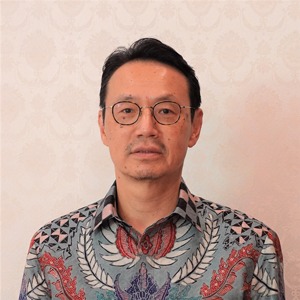
As Indonesia ramps up COVID-19 vaccination drive, Magdalene Pelamonia continues delivering vaccines in portable refrigerators with strict temperature controls to communities on the eastern island of Ambon. Her mission is centered on a digital tracking system called SMILE that ensures the efficacy of vaccines. Many other health workers have benefited from the digital tool, which has reduced vaccine verification and stock checking to minutes rather than hours.
The 36-year old health worker Magdalene may be at the forefront of a digital transformation that has improved the efficiency of health-care delivery to Indonesia’s 274 million people. But is enough being done to digitalize Indonesia’s health sector ?
Indonesia’s Ministry of Health this week launched a blueprint for on the digitalization of health sector, in partnership with UNDP and funding from the Government of Japan. The blueprint comes as the country pushes its COVID-19 vaccination drive to the much-needed herd immunity level. The blueprint also reflects Indonesia’s growing urgency to strengthen health services as part of the SDG agenda.
These digital health interventions are aligned with Indonesia’s health sector priorities to deal with disease burden, improve care quality, improve maternal and child health, and support Indonesia’s health system transformation as a whole. Ultimately,the blueprint will benefit patients seeking access to healthcare, healthcare workers in providing better services, and health system managers in carrying out their responsibilities.
At the same time, the blueprint has been developed by fully reflecting on the lessons from similar experiences of the past. That is to say that any such strategy is not about developing another digital application, but that these information and technological solutions can only be effective if they are built on a vision for policy and operational enhancements driven with strong political commitment.
For example, there is a need to create a truly integrated and comprehensive system on citizen information that will allow the Government to make sound decisions in addressing health-related challenges. Or, as the blueprint notes, different Ministries are currently using different platforms to store information about on state pensions and health care.Furthermore, there is a fundamental need to increase the availability and quality of health data and information to improve the quality of health services and the work process.Improved accuracy of the data and information will greatly enhance the capacity of the Government in handling the current and future pandemic situations.
Another key requirement is stronger regulatory frameworks that can safeguard digital information on patients along with stronger transparency of data in the health sector. Therefore, digitalization in the health sector needs reinforcement on policy and institutional readiness, as well as adequate human capacityboth at central and provincial levels.
The expansion of digital connectivity calls for private sector’s greater involvement. According to the Ministry of Health, the private sector accounts for only two percent of health-care investment, indicating a huge opportunity for the private sector.Other innovative SDG financing schemes may be put to use for this purpose, including expansion of public financing for the health sector and impact investment. The Government has budgeted USD 2.5 billion to improve digital connectivity, but innovative financing schemes have the potential to bridge the funding gaps, by increasing multi-stakeholder collaboration, particularly with the private sector..
Improving the digital infrastructure will also address Indonesia’s digital divide. According to the World Bank, approximately 53 percent of Indonesia’s population have internet access. 47 percent of those who are “off the grid†include marginalized communities in remote areas, poor to vulnerable urban families including children and women in underdeveloped areas – all of whom require quality health services most. As administrative process such as registration and medicine verification going digital, those who are not connected digitally could be at risk of not receiving direct health services.
Innovation is the driving force behind success. Hence, constant innovation is another critical component for putting the digital health national strategy into action. As a country that values science and technology, Japan is constantly looking for new ways to innovate digital know-how. In Japan, both public and private sectors have been promoting digital services in the health and medical sector. For example, Japan has advanced medical care by utilizing high-definition cameras and sensors, and is now promoting R&D on telemedicine for more efficient medical service. In addition, the number of people who use health care application in their mobile devices has increased in recent years.Digital technology is changing the medical environment in Japan.
Digital service in the health and medical sector is supported by the digitalization of the whole society. Japan aims to ensure that every citizen in Japan can benefit from digital technology. As the first step, Japan needs to promote digitalization ingovernment agencies and realize integrated information systems in the public sector. For that reason, the Japanese government established a Digital Agency in September 2021. The Digital Agency is expected to progress digitalization policy such asformulating a fundamental plan for the digitalization, developing digital personal identification system and integrating and optimizing online services and digital infrastructure, with the goal of improving public services and digitalization in society.
The blueprint marks a milestone in the Indonesian government’s ambition to leading the digital health transformation. Moving forward, Japan and UNDP hope to join hands with Indonesia toward health digitalization.
Back in Ambon, health worker Magdalene says that in her 15 years working in the health sector, she has never seen such a rapid transformation, following the adoption of digital tool SMILE. The next step is to create a transparent, integrated and inclusive digital health system to strengthen health services, on a national scale.
By Ambassador Kanasugi and Shimomura Norimasa, UNDP Indonesia Resident Representative
